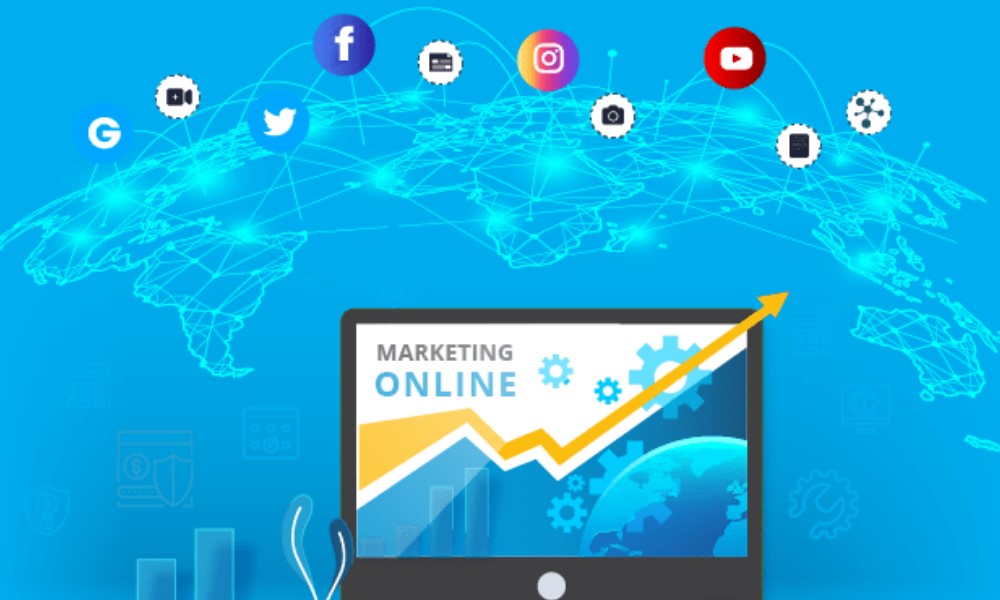How to Start Online Marketing Business in 2024 – Best Guide for Beginners
Starting an Online Marketing Business in 2024 is an excellent way to tap into the digital economy and reach a global audience. With the right strategies and tools, you can build a successful online marketing business that helps other companies grow while generating significant revenue.
Understanding Online Marketing

Online marketing, also known as digital marketing, involves promoting products or services through internet-based channels. It encompasses various strategies such as search engine optimization (SEO), content marketing, social media marketing, email marketing, and pay-per-click (PPC) advertising.
Online marketing aims to reach a broader audience, engage with potential customers, and drive traffic to websites. By leveraging digital platforms like search engines, social media, and email, businesses can create targeted campaigns that deliver personalized content to specific audiences.
This form of marketing is highly measurable, allowing companies to analyze campaign performance and optimize their strategies in real-time. Effective online marketing helps businesses increase brand visibility, generate leads, and ultimately, drive sales.
In today’s digital age, mastering online marketing is essential for businesses looking to stay competitive and connect with their audience on a global scale.
Steps to Start an Online Marketing Business

1. Research and Planning
Market Research:
- Identifying your target audience, understanding their needs, and analyzing competitors are crucial first steps. Conduct surveys, use online tools like Google Trends, and study your potential competitors’ strengths and weaknesses.
Business Plan:
- Develop a comprehensive business plan that outlines your goals, strategies, and financial projections. This plan should cover your mission statement, market analysis, marketing strategy, operational plan, and financial plan. Having a solid business plan not only helps in clarifying your vision but also is essential if you plan to seek funding or investors.
2. Choose Your Niche
Focusing on a specific area of online marketing helps you to establish expertise and stand out in the market. Consider niches such as SEO, content marketing, social media management, email marketing, or influencer marketing. Specializing allows you to target a specific audience more effectively and provide tailored solutions.
3. Develop Your Skills
Training and Certification:
- Online marketing requires a specific set of skills. Enroll in courses and obtain certifications from reputable institutions like Google, HubSpot, and SEMrush. These courses cover essential areas like SEO, PPC, content marketing, and social media strategies. Continually updating your skills is important as digital marketing trends and tools evolve rapidly.
4. Set Up Your Business
Legal Structure:
- Choose a legal structure for your business, such as a sole proprietorship, partnership, LLC, or corporation. This decision will affect your taxes, personal liability, and other legal obligations. Register your business name and obtain any necessary licenses or permits.
Branding:
- Create a strong brand identity, including a unique business name, logo, and professional website. Your branding should reflect your business values and appeal to your target audience. A well-designed website acts as your online storefront and should include information about your services, portfolio, client testimonials, and contact details.
5. Create a Marketing Strategy
Content Strategy:
- Plan and create valuable content that attracts and engages your target audience. Your content should address the needs and pain points of your audience, offering solutions and insights. Regularly update your blog, create whitepapers, eBooks, and use video marketing to reach a wider audience.
SEO:
- Optimize your website and content for search engines to increase visibility. Use keyword research tools to identify relevant keywords, and ensure your website’s technical SEO is up to date. Quality backlinks, meta descriptions, and alt tags are crucial elements to enhance your site’s SEO.
6. Build an Online Presence
Website:
- Develop a professional website that showcases your services and expertise. Ensure your site is mobile-friendly, has a fast loading speed, and offers a good user experience. Use clear calls-to-action (CTAs) to guide visitors towards desired actions like signing up for a newsletter or requesting a consultation.
Social Media:
- Create and maintain profiles on relevant social media platforms where your target audience is most active. Regularly post engaging content, interact with followers, and use social media advertising to expand your reach.
7. Acquire Tools and Resources
Invest in essential digital marketing tools for SEO, analytics, email marketing, and social media management. These tools streamline your workflow, provide valuable insights, and enhance your marketing efforts.
8. Launch and Promote Your Business
Use various marketing tactics to attract clients, such as PPC advertising, social media campaigns, and networking. Attend industry conferences, join professional groups, and collaborate with other businesses to increase your visibility and build a network of potential clients.
Key Benefits of Starting an Online Marketing Business
1. Low Startup Costs
Starting an online marketing business requires minimal investment compared to traditional businesses. You mainly need a computer, internet connection, and digital marketing tools. Unlike physical businesses that require rent, inventory, and staff, your initial costs are significantly lower, making it accessible for many entrepreneurs.
2. Flexibility and Remote Work
Running an online marketing business offers the flexibility to work from anywhere. This remote work model is ideal for maintaining a work-life balance and attracting a global client base.
You can manage your business from a home office, a coworking space, or while traveling, providing you with the freedom to choose your work environment.
3. High Demand
With more businesses recognizing the importance of digital presence, the demand for online marketing services is continually growing. This trend presents ample opportunities for new marketers to enter the industry and thrive.
Businesses of all sizes are seeking online marketing experts to help them navigate the digital landscape and achieve their marketing goals.
4. Scalability
An online marketing business can easily scale by expanding services, increasing the client base, or automating processes. This scalability allows for significant growth potential.
As you gain more clients and revenue, you can hire additional staff, invest in advanced tools, and explore new markets, continuously growing your business.
Essential Tools for Online Marketing

Here are five essential tools that can help you start and grow your online marketing business:
1. SEMrush
- Features: SEO analysis, keyword research, competitor analysis, content marketing tools.
- Pros: Comprehensive SEO tools, detailed analytics, user-friendly interface.
- Cons: Expensive for small businesses.
- Price: $119.95/month (Pro plan)
- Website: SEMrush
SEMrush is a comprehensive tool for SEO and online marketing. It offers features like keyword research, site audits, and competitive analysis, helping you optimize your website and content for better search engine rankings.
2. Ahrefs
- Features: Backlink analysis, keyword research, competitor analysis, rank tracking.
- Pros: Robust backlink database, excellent keyword research tools.
- Cons: Limited data on smaller websites.
- Price: $99/month (Lite plan)
- Website: Ahrefs
Ahrefs is known for its powerful backlink analysis and keyword research capabilities. It helps you understand your competitors’ strategies and identify opportunities to improve your own SEO efforts.
3. HubSpot
- Features: CRM, marketing automation, content management, analytics.
- Pros: All-in-one marketing platform, integrates with various tools.
- Cons: Higher tiers can be expensive.
- Price: Free (basic CRM), $50/month (Starter plan)
- Website: HubSpot
HubSpot offers a suite of tools for CRM, marketing automation, and content management. It’s an all-in-one platform that helps you manage customer relationships, create and distribute content, and measure your marketing performance.
4. Mailchimp
- Features: Email marketing, automation, landing pages, analytics.
- Pros: User-friendly, extensive email templates, free tier available.
- Cons: Limited automation features in the free plan.
- Price: Free (up to 2,000 subscribers), $9.99/month (Essentials plan)
- Website: Mailchimp
Mailchimp is a popular email marketing tool that allows you to create and automate email campaigns. Its user-friendly interface and extensive template library make it easy to design professional emails.
5. Canva
- Features: Graphic design tool, social media graphics, templates, branding.
- Pros: Easy to use, extensive template library, free plan available.
- Cons: Limited features in the free plan.
- Price: Free, $12.95/month (Pro plan)
- Website: Canva
Canva is a graphic design tool that helps you create visually appealing graphics for social media, websites, and marketing materials. Its drag-and-drop interface and vast template library make it accessible for users without graphic design experience.
Comparison Table
| Tool | Features | Pros | Cons | Price |
|---|---|---|---|---|
| SEMrush | SEO analysis, keyword research | Comprehensive SEO tools, detailed analytics | Expensive for small businesses | $119.95/month |
| Ahrefs | Backlink analysis, keyword research | Robust backlink database, excellent keyword tools | Limited data on smaller sites | $99/month |
| HubSpot | CRM, marketing automation | All-in-one platform, integrates with various tools | Higher tiers can be expensive | Free (basic), $50/month |
| Mailchimp | Email marketing, automation | User-friendly, extensive templates | Limited automation in free plan | Free, $9.99/month |
| Canva | Graphic design, social media graphics | Easy to use, extensive templates | Limited features in free plan | Free, $12.95/month |
Use Cases and Problem Solving
Online marketing tools solve several common business problems, including:
Improving Online Visibility
Tools like SEMrush and Ahrefs help improve your website’s visibility on search engines, attracting more organic traffic. They provide insights into keyword performance, backlink profiles, and competitor strategies, enabling you to make data-driven decisions to enhance your SEO efforts.
Managing Customer Relationships
HubSpot’s CRM helps manage customer interactions, streamline sales processes, and enhance customer satisfaction. It allows you to track leads, automate follow-ups, and analyze customer data to improve your marketing strategies and increase conversion rates.
Effective Email Campaigns
Mailchimp allows you to design and automate email campaigns, ensuring effective communication with your audience. It offers segmentation options, A/B testing, and detailed analytics, helping you tailor your messages to different audience segments and measure the success of your campaigns.
Creating Professional Graphics
Canva helps create visually appealing graphics for social media, websites, and marketing materials without requiring graphic design skills. It offers a wide range of templates and design elements, making it easy to create professional-looking visuals that enhance your brand’s online presence.
How to Buy and Where to Buy
- Visit Official Websites:
- Purchase or subscribe to the tools directly from their official websites. Ensure you review their features and pricing plans to choose the one that fits your business needs.
- Compare Plans:
- Review different pricing plans and choose one that fits your budget and business needs. Many tools offer tiered pricing with different levels of features and services.
- Free Trials:
- Many tools offer free trials or free versions, allowing you to test the features before committing to a paid plan. Use these trials to determine which tools work best for your business.
Buy from Trusted Sources:
- SEMrush
- Ahrefs
- HubSpot
- Mailchimp
- Canva
Conclusion
Starting an online marketing business in 2024 offers tremendous opportunities for growth and success. With minimal startup costs and the flexibility to work from anywhere, digital marketing is an accessible and scalable business model.
By focusing on key areas such as SEO, content marketing, and social media management, you can build a strong online presence for your clients and drive significant results. Utilizing essential tools like SEMrush, Ahrefs, HubSpot, Mailchimp, and Canva will streamline your processes and enhance your marketing efforts.
Comprehensive planning, ongoing skill development, and strategic implementation are crucial for success in this dynamic field. As the demand for digital marketing services continues to grow, your expertise will be invaluable to businesses seeking to thrive in the digital landscape.
Embrace the opportunities, stay updated with industry trends, and deliver exceptional value to your clients to build a thriving online marketing business.
FAQs
- What is the best tool for SEO?
- SEMrush and Ahrefs are both excellent for SEO, offering comprehensive tools for keyword research, backlink analysis, and competitor analysis.
- Can I start an online marketing business with no experience?
- Yes, but it’s beneficial to take online courses and obtain certifications from reputable institutions like Google and HubSpot.
- How much does it cost to start an online marketing business?
- Startup costs can vary, but you can start with minimal investment in essential tools and gradually scale up as your business grows.
- Is email marketing still effective?
- Yes, email marketing remains a powerful tool for reaching and engaging with your audience, especially with automation tools like Mailchimp.
- How do I choose the right niche for my online marketing business?
- Research market demand, assess your skills and interests, and identify gaps in the market to find a niche that aligns with your expertise and offers growth potential.